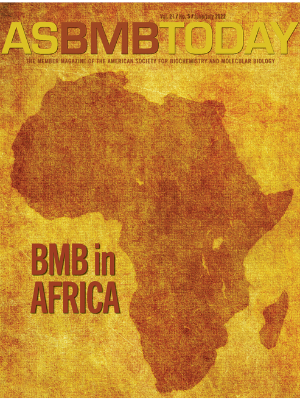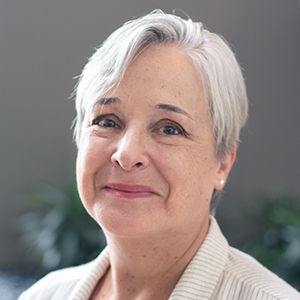BMB stories from Africa
Just about every day, I need to look up information about an ASBMB member in our membership database. Before I can do a search, I land on a page of pie charts that provide membership demographics. Want to know how many folks in the ASBMB are industry members or between 40 and 49 years old? It knows that.
Among the pie charts is one that sorts by region, which mainly means by continent (though the Caribbean gets its own sliver). Of course, most of the pie is North America — and there’s no piece for Antarctica, though I suspect some BMB researchers make it down to McMurdo or other research stations.

The continent with the smallest ASBMB membership slice is Africa.
I first noticed this more than two years ago, and I idly wondered about these members in Africa: Who are they, and what’s it like to do research on a continent where many countries are rich in natural resources yet perennially cash-strapped and often politically unstable? I thought it would be great to focus an issue of ASBMB Today on these members. I asked the membership team to send me a list of their names and emails.
But then there was a pandemic, and the world went nuts. For a while, Africa went to my back burner. It simmered there until one of my co-workers helpfully suggested we should schedule that BMB in Africa issue — for June–July 2022.
So I got an updated list of names and emails. At this point, in late 2021, we had 40 members in African countries: 24 in Nigeria, five in South Africa, four in Egypt, three in Ghana, two in Kenya, and one each in Zimbabwe and Burkina Faso.
I wasn’t really sure how it would work, but I sent a little questionnaire to these 40 members, asking if they’d either write us an essay or be interviewed by an ASBMB Today contributor. We also contacted a few U.S.-based members who had moved here from countries in Africa. The results of the responses — plus a couple of fun features — are in these pages.
Our goal here is not to make any sweeping generalizations about science in Africa. It’s a huge continent of 54 nations spread across six time zones and almost 12 million square miles with more than 1.2 billion people speaking as many as 3,000 different languages. I’m not qualified to generalize on that scale.
Rather, what we’re doing here is what ASBMB Today does best: sharing stories. I’ve learned a lot from reading these stories. I hope you do too.
Enjoy reading ASBMB Today?
Become a member to receive the print edition four times a year and the digital edition monthly.
Learn moreGet the latest from ASBMB Today
Enter your email address, and we’ll send you a weekly email with recent articles, interviews and more.
Latest in Opinions
Opinions highlights or most popular articles

Women’s health cannot leave rare diseases behind
A physician living with lymphangioleiomyomatosis and a basic scientist explain why patient-driven, trial-ready research is essential to turning momentum into meaningful progress.

Making my spicy brain work for me
Researcher Reid Blanchett reflects on her journey navigating mental health struggles through graduate school. She found a new path in bioinformatics, proving that science can be flexible, forgiving and full of second chances.

The tortoise wins: How slowing down saved my Ph.D.
Graduate student Amy Bounds reflects on how slowing down in the lab not only improved her relationship with work but also made her a more productive scientist.

How pediatric cataracts shaped my scientific journey
Undergraduate student Grace Jones shares how she transformed her childhood cataract diagnosis into a scientific purpose. She explores how biochemistry can bring a clearer vision to others, and how personal history can shape discovery.

Debugging my code and teaching with ChatGPT
AI tools like ChatGPT have changed the way an assistant professor teaches and does research. But, he asserts that real growth still comes from struggle, and educators must help students use AI wisely — as scaffolds, not shortcuts.

AI in the lab: The power of smarter questions
An assistant professor discusses AI's evolution from a buzzword to a trusted research partner. It helps streamline reviews, troubleshoot code, save time and spark ideas, but its success relies on combining AI with expertise and critical thinking.

